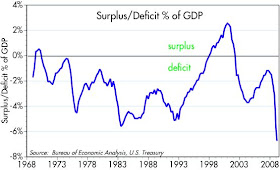


These charts reflect revenue and spending data through February 2009, with my assumption for GDP growth (-4% real growth for the quarter, plus 2% inflation). The point is that spending and deficits are "off the charts." By the time we get to the end of this year or early next year, federal spending will be close to 30% of GDP, and the deficit will probably be 13% of GDP.
To be fair, a lot of the spending this year is "emergency" spending, and is not really spending per se. It is the result of government (and Fed) purchases of securities. So it might be appropriate to call it a type of investment, since not all the money spent on security purchases will be wiped out, and some securities may even result in a profit for the government.
Looking out over the long term, however, Obama's wish list budget calls for government spending to average about 22% of GDP. That's rather fanciful in my view, since a lot of the extra spending jammed into the budget already for this year will be very hard to reverse entirely in the years to come. A conservative estimate would be for government spending to average at least 23% of GDP and possibly more, if Congress acquiesces to all that the Obama administration is asking for. We haven't seen anything like that since WW II.
If government spending is going to be at least 23% of GDP in the future, whereas for the past 40 years revenues have averaged a bit less than 18% of GDP, then we are either going to have gargantuan deficits for as far as the eye can see (5% of today's GDP is $750 billion), or we are going to have a significant increase in the economy's tax burden. I pin my hopes for "change" on the fact that, no matter how high tax rates have been in the past (recall the 70% top marginal rates in the late 1970s and early 1980s), the federal government has never been able to grab much more than 20% of the economy's income. I think this economy is going to significantly resist a massive expansion of government and its attendant tax burdens. If it does, then that would be extremely bullish news for financial markets.

Come on now Scott. You're not so superstitious as to believe in something as ludicrous as Hauser's Law? There's no scientific empirical research at all that justifies such a ridiculous position. Even logical theoretical theories don't support this. Come back to planet earth and stop reading your tea leaves and entrails.
ReplyDeleteMark: Aren't you the one that says empirical facts are the only ones that count?
ReplyDeleteCome on, Mark. Scott is clearly not saying that federal tax revenues will always equal 19.5% of GDP irrespective of marginal rates. His argument is that there is a limit to public sector growth/taxation beyond which the private sector economy will fight back.
ReplyDeleteEnough sophistry already, Mark.
When the revenue the government expected falls short as it will, increasing marginal rates never provides the increase in tax revenue they think it will, the call for even higher taxes will go out.It always does.
ReplyDeleteI used to live in NJ,a high property tax , high state income tax and high sales tax state, no matter they always were looking to fill the hole in their budget.
It's not the lack of revenue , it's the spending.
Big income earners and corporations are going to fight this attempt to hike their taxes. They can easily move income offshore or relocate to Switzerland as some oil companies are doing already. Los Angeles filmakers can produce movies in Canada or anywhere else they are offered tax incentives. The ones who can't avoid the higher taxes are the people in the middle class. Obama is simply misleading the middle class when he says they won't pay higher taxes. There is a tax revolt already underway.
ReplyDeleteThis was great information. Very informative. Helps us have a realistic view of what is going on economically in your area. Can't really rely on the media to give us that accurate picture..
ReplyDeletehttp://utahcribs.wordpress.com/
Great post Scott, I read you every day for the interesting analyses you so generously provide.
ReplyDeleteBeyond the limit of tax revenues/rates, there is another important factor, distinguishing the USA from f.ex. European countries; it is that the US politicians haven't legislated automatic funding of their parties (based on vote results), and they still have to go out to their constituents and raise money and support.
The US politicians are then not as insulated from the bad consequences of their stupid policies, as their counterparts across the Atlantic.
Politicians do not care about raising revenues unless it secures them votes. The mission right now is to find the scapegoat in order to secure more votes because that is what the public wants. Regardless of the social cost…
ReplyDeleteI was reprimanded by Jon S. as usual. However, before you all go John Galt, consider this:
ReplyDeleteNo counter argument. I just wanted to let you know that my nickname in high school was "Sadistic," and that I earned it. Hahaha!
Scott I respect your belief in free markets and the will of tax payers to remain as free as possible from expensive big government. Good to hear that you are having a good vacation
ReplyDelete